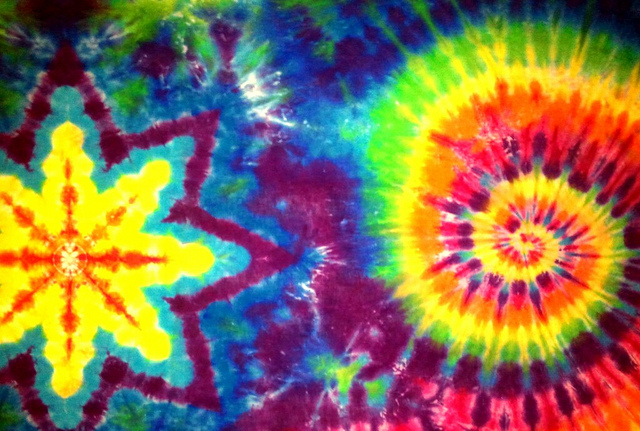Playing and mixing of colors and creating colorful and beautiful treasures from it was one of the best things we’ve done in our childhood. Even today’s time, doing anything with colors brings a big smile on our faces. I remember when I was in the school, was engaged in many activities related to colors like painting, rangoli making, poster making and etc. But for me, the most amazing activity was the tie-dye. Though I got a chance to finally do it in my school but I heard about it a much before from my mother. At first, when I heard its name, I thought it was something to do with ‘tie’ which we use to wear along with our school uniform. And like me, anyone could be confused by its name at first. Then my mother cleared all my doubts and explained me clearly about tie-dye.
Contents
What is Tie Dye?
To have a clear understanding of tie-dye, it’s better to first know its meaning separately. So the word tie means to bind or secure something with rope or string. Whereas the word dye means to soak something like cloth in a color. So tie-dye as together basically means an activity in which we create designs or patterns on clothes by tieing some areas with rubber bands or strings. Tie- dye is a great art form which surprises us with its beautiful and unusual patterns. It is not that difficult rather very simple and anyone can do it with so much fun. The only thing required in this is your patience.
History of Tie Dye
Though many of you heard it for the first time. But like other things, it also has a long history. Do you know when it was invented? Do you know where has its origin?
Many believe that tie-dye was started in the 1960s and 1970s by American youths. But this art form is the oldest one. It was started over 5000 years ago in India. Now I wonder why India is called an incredible India. India has given birth to so many art forms and tie-dye is among one of them. India has a rich cultural heritage which no other county in the world can beat it. Tie – dye is called as bandhni or bandhej in India. Starting from India, soon this form spread to other countries of Asia and Africa. Even earliest example of tie-dye is also seen in the 8th century in Japan. There it was known as shibori.
Techniques of tie-dye are almost same in most of the culture. The only difference is its name. Tie – dye is called differently in different countries. Like in India, it is bandhni, in Japan it is shibori, in Thailand, it is mudmee, in Indonesia it is plangi and tritik, in Africa, it is adire and of course in Western countries, it is called tie-dye.
Amazing features of Tie Dye
- Tie-dye is simple and anyone can do it.
- It is a handmade activity.
- It is not that expensive.
- It takes a little time and patience.
- It’s a fun activity with colors.
- Variety of colors are used in this like red, orange, yellow, green, blue and etc.
- The colors used for dye are of two types i. e natural dye which can be extracted from flowers, leaves, roots, spices, insects etc. Another one is the synthetic dye which is made from chemical compounds like copper, lead, mercury, chromium, benzene and etc.
- Through tie-dye, even old and dull clothes can be turned into beautiful ones.
- Any design can be created through tie-dye like a spiral, stripes, circles by using coins, bullseye, knot, fold and etc.
- Through tie-dye, we can design or make T-shirts, frocks, dupattas, pillow covers, bedsheets, curtains, scarfs, and etc.
Above mentioned are common features but when you all do this activity, you’ll come across many other features also.
Basic instructions for Tie Dye
As already mentioned before that tie-dye is not a difficult art form. The only thing you needed is the proper guidance or instructions for doing it. So here I am going to provide the basics for tie-dye in a very simple way.
Things needed for tie-dye:-
- A white cloth ( purely cotton) or any dress material you want.
- Coins, stone or anything you want for creating a design.
- Dye colors
- String, thread or rubber to tie the cloth.
- Hot water
- Color fixer or salt.
Procedure for tie-dye
- First, take a white cloth. Before using it for the tie-dye, wash it and after drying it, ironed it properly. Doing this is important because if the cloth is clean and not crushed a nice design will be created and color will also apply to it nicely.
- Then think of a design what you want to see on the cloth. For example, here I mentioned about coins. If we use coins then circle design will be created.
- Tie the coins with thread or rubber tightly at different places on the cloth.
- While doing this, side by side you can prepare the dye in hot water. Take the color powder and put in the water and boil it for 15 to 20 minutes.
- You can use any color for your design but remember one thing, use the light color first before the dark one otherwise light color will not be applied to a dark color. For example, if you want to use yellow and red color then use yellow first and then red on the selected areas.
- Then soak your cloth in the dye for 10-15 minutes.
- After that take out the cloth and put it in the salt water or color- fixer water. So that the color gets fixed on the cloth.
- Then dry your cloth. After that open the thread and take out the coins.
- Now your beautiful designed cloth is ready.
